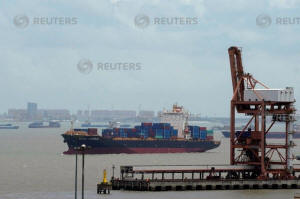|
Trump says he expects to raise China
tariffs: Wall Street Journal
 Send a link to a friend
Send a link to a friend
 [November 27, 2018]
WASHINGTON/BEIJING (Reuters) - U.S.
President Donald Trump said on Monday he expected to move ahead with
raising tariffs on $200 billion in Chinese imports to 25 percent from
the current 10 percent and repeated his threat to slap tariffs on all
remaining imports from China. [November 27, 2018]
WASHINGTON/BEIJING (Reuters) - U.S.
President Donald Trump said on Monday he expected to move ahead with
raising tariffs on $200 billion in Chinese imports to 25 percent from
the current 10 percent and repeated his threat to slap tariffs on all
remaining imports from China.
In an interview with the Wall Street Journal four days ahead of his
high-stakes meeting with Chinese President Xi Jinping in Argentina,
Trump said it was "highly unlikely" he would accept China's request to
hold off on the increase, which is due to take effect on Jan. 1.
"The only deal would be China has to open up their country to
competition from the United States," Trump told the Journal. "As far as
other countries are concerned, thatís up to them."
Trump, who is due to meet Xi on the sidelines of a G20 summit in Buenos
Aires this week, said that if negotiations were unsuccessful, he would
also put tariffs on the rest of Chinese imports.
"If we donít make a deal, then I'm going to put the $267 billion
additional on," at a tariff rate of either 10 percent or 25 percent,
Trump told the Journal.
A Chinese official told reporters last week that the two leaders would
look to set guidelines for future talks.
"The main issue is how to settle down the trade war," the official said
on condition of anonymity due to the sensitive nature of preparatory
negotiations. "I am conservatively optimistic that can be done," he
added.

At a regular news briefing in Beijing on Tuesday, Chinese foreign
ministry spokesman Geng Shuang reiterated China's hope that both sides
could work towards a "positive outcome" from the meeting between the two
leaders, citing a "consensus" they reached during a Nov. 1 telephone
call.
DOUBLED-EDGED SWORD
Last week, Washington proposed stepping up scrutiny over technology
exports in 14 key high-tech areas including artificial intelligence and
microprocessor technology, a move many analysts believe was directly
aimed at China.
"If the United States does not buy Chinese products and U.S. technology
is not forthcoming, would that really benefit U.S. companies?" said Xu
Nanping, China's vice minister of Science and technology.
"We can buy from Japan and South Korea or develop our own. What would
the United States do?" Xu told a small group of reporters in Beijing on
Tuesday, adding that China accounts for at least half of the market for
many U.S. listed companies.
Technology controls would also be a double-edged sword, so in the long
term it would not be a win-win situation, but a lose-lose one, Xu said.
"In the manufacturing chain, China occupies the low end and middle
section, while the United States is on the middle to high end. Once the
chain is broken, the United States would be affected too."
[to top of second column]
|

Shipping containers are seen at a port in Shanghai, China July 10,
2018. REUTERS/Aly Song

TECH GOODS
Trump said the next round of tariffs could also be placed on laptops
and Apple Inc's iPhones imported from China, which are part of that
$267 billion list of goods not yet hit by tariffs.
Cell phones and computers, among China's biggest exports to the
United States, have been spared as the administration has sought to
minimize the impact on U.S. consumers. The Journal said the
administration has been worried about a consumer reaction to such
levies.
"Maybe. Maybe. Depends on what the rate is," Trump said, referring
to the possibility of tariffs on mobile phones and laptops,
according to the Journal. "I mean, I can make it 10 percent, and
people could stand that very easily."
Shares in Apple fell in after-hours trading after the interview was
published. An Apple spokesman did not immediately respond to
Reuters' queries.
Apple CEO Tim Cook has personally pressed the issue of tariffs with
Trump, telling the president that while there are valid concerns
about U.S.-China trade relations, tariffs are not the best way to
resolve them.
Despite using contract manufacturers to make most of its products
overseas, Apple has also sought to emphasize its contribution to the
U.S. economy, saying it plans to spend about $55 billion in 2018
with its U.S.-based suppliers.
(Additional reporting by Philip Wen, Ryan Woo and Yawen Chen in
BEIJING; Reporting by Eric Beech; Editing by Peter Cooney, Lisa
Shumaker & Shri Navaratnam)
[© 2018 Thomson Reuters. All rights
reserved.]
Copyright 2018 Reuters. All rights reserved. This material may not be published,
broadcast, rewritten or redistributed.
Thompson Reuters is solely responsible for this content.
 |